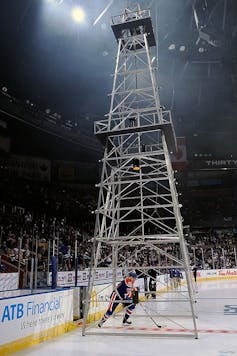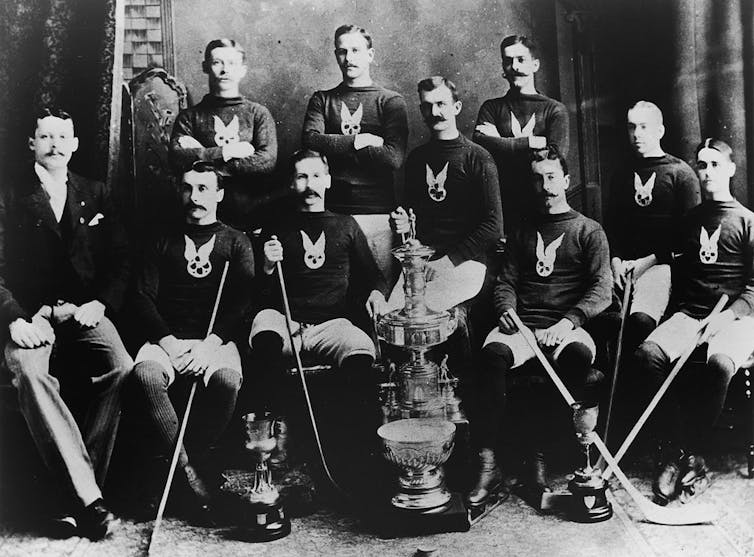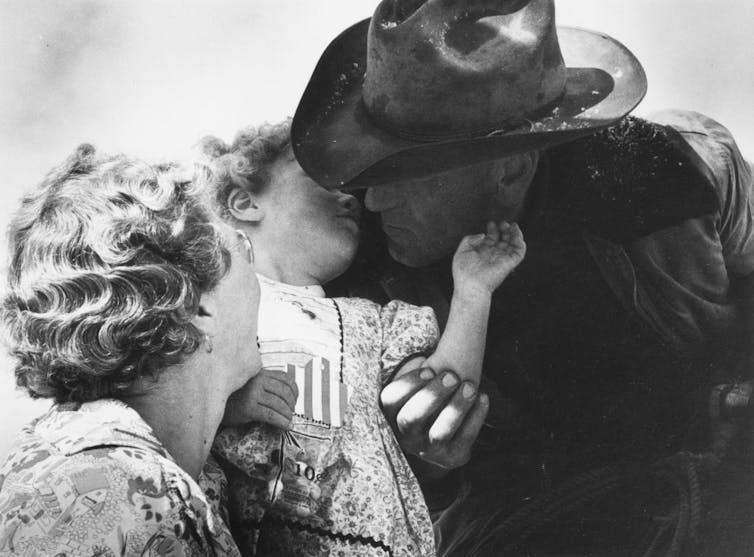THEY WERE SHUT OUT BY THE PANTHERS
The Edmonton Oilers are more than a hockey team. In some ways, they symbolize devotion to a way of life − and one of Canada’s major industries.
OIL PRAYER; PLEASE LORD GIVE US ANOTHER OIL BOOM, WE WON'T BLOW IT THIS TIME

June 21, 2024
By Cody Musselman, Judith Ellen Brunton
(The Conversation) — Hockey’s biggest prize is the Stanley Cup, and for the first time in nearly two decades, the Edmonton Oilers are vying for it. Hoping to stage a comeback against the Florida Panthers, the Oilers are two wins away from becoming National Hockey League champions.
The finals are bringing new attention to Edmonton, former team of the legendary Wayne Gretzky. But they’re also bringing attention to some of Canada’s biggest exports: hockey and oil.
Novelist Leslie McFarlane once observed that for Canadians, “hockey is more than a game; it is almost a religion.” Now that the Oilers have a chance to bring the Stanley Cup back to Canada for the first time in nearly 30 years, prayers and superstitions abound, from wearing special clothing to fans averting their eyes during penalty shots.
The Oilers also evoke another aspect of Canadian society with almost religious importance: resource extraction. In American and Canadian culture, oil has long been entangled with religion. It’s a national blessing from God, in some people’s eyes, and a means to the “good life” for those who persevere to find it.
We are scholars of religion who study sports and how oil shapes society, or petro-cultures. The Edmonton Oilers showcase a worldview in which triumph, luck and rugged work pay off – beliefs at home on the ice or in the oil field. The Stanley Cup Final offers a glimpse into how the oil industry has helped shaped the religious fervor around Canada’s favorite sport.
By Cody Musselman, Judith Ellen Brunton
(The Conversation) — Hockey’s biggest prize is the Stanley Cup, and for the first time in nearly two decades, the Edmonton Oilers are vying for it. Hoping to stage a comeback against the Florida Panthers, the Oilers are two wins away from becoming National Hockey League champions.
The finals are bringing new attention to Edmonton, former team of the legendary Wayne Gretzky. But they’re also bringing attention to some of Canada’s biggest exports: hockey and oil.
Novelist Leslie McFarlane once observed that for Canadians, “hockey is more than a game; it is almost a religion.” Now that the Oilers have a chance to bring the Stanley Cup back to Canada for the first time in nearly 30 years, prayers and superstitions abound, from wearing special clothing to fans averting their eyes during penalty shots.
The Oilers also evoke another aspect of Canadian society with almost religious importance: resource extraction. In American and Canadian culture, oil has long been entangled with religion. It’s a national blessing from God, in some people’s eyes, and a means to the “good life” for those who persevere to find it.
We are scholars of religion who study sports and how oil shapes society, or petro-cultures. The Edmonton Oilers showcase a worldview in which triumph, luck and rugged work pay off – beliefs at home on the ice or in the oil field. The Stanley Cup Final offers a glimpse into how the oil industry has helped shaped the religious fervor around Canada’s favorite sport.

Edmonton Oilers fan Dale Steil’s boots before the team’s playoff game against the Los Angeles Kings on April 26, 2024.
AP Photo/Tony Gutierrez
Boomtown
Edmonton is the capital of Alberta, a province known for its massive oil, gas and oil sands reserves. With five refineries producing an average of 3.8 million barrels a day, oil and gas is Alberta’s biggest industry – and a way of life.
This is especially true in Edmonton, known as the “Oil Capital of Canada.” Here, oil not only structures the local economy, but it also shapes identities, architecture and everyday experiences.
Visit the West Edmonton Mall, for example, and you’ll see a statue of three oil workers drilling, reminding shoppers that petroleum is the bedrock of their commerce. Visit the Canadian Energy Museum to learn how oil and gas have remade the region since the late 1940s, and glimpse items such as engraved hard hats and the “Oil Patch Kid,” a spin on the iconic “Cabbage Patch Kids” toys. Tour the greater Edmonton area and see how pump jacks dot the horizon. Oil is everywhere, shaping futures, fortunes and possibility.

Pumpjacks near Acme, Alberta, Canada – a regular sight.
Michael Interisano/Design Pics Editorial/Universal Images Group via Getty Images
Set against this backdrop, the Oilers’ name is unsurprising. It is not uncommon, after all, to name teams after local industries. Football’s Pittsburgh Steelers pay homage to the steel mills that once employed much of the team’s fan base. The Tennessee Oilers were originally the Houston Oilers, prompting other Texas teams such as the XFL’s Roughnecks to follow suit. Further north, the name of basketball’s Detroit Pistons references car manufacturing.
Teams with industry-inspired names play double duty, venerating both a place and a trade. Some fans are not only cheering for the home team but cheering for themselves – affirming that their industry and their labor matters.

Ales Hemsky of the Edmonton Oilers skates out from under the oil derrick for a game at Rexall Place in 2008 in Edmonton, Alberta, Canada.
Andy Devlin/NHLI via Getty Images
In a recent TikTok video, a man overcome with joy at the Oilers’ victory over the Dallas Stars claps his hands and hops around his living room. The caption reads, “My first-generation immigrant oil rig working Filipino father who has never played a second of hockey in his life…happily cheering for the Oilers advancing in the playoffs. Better Bring that cup home for him oily boys.” He appears to be cheering for the Oilers not because they are a hockey team, but because they are an oil team.
And indeed, the Oilers are an oily team. The Oilers’ Oilfield Network, for example, describes itself as “exclusively promot[ing] companies in the Oil and Gas industry,” allowing leaders to connect “through the power of Oilers hockey.”
The Oilers’ connection with industry is further underscored by their logos. The current one features a simple drop of oil, but past designs featured machinery gears and an oil worker pulling a lever shaped like a hockey stick.
Liquid gold
There is a long tradition of pairing hockey with oil – and with Canada itself.
After the British North America Act founded Canada in 1867, the new nation searched for a distinctive identity through sport and other cultural forms.
Enter hockey. The winter game evolved in Canada from the Gaelic game of “shinty” and the First Nations’ game of lacrosse and soon became part of the glue holding the nation together.
Ever since, media, politicians, sports groups and major industries have helped fuel fan fervor and promoted hockey as integral to Canada’s rugged frontiersman character.

The Montreal Amateur Athletic Association posing with the first Stanley Cup in 1893.
Bruce Bennett Studios via Getty Images Studios/Getty Images
In 1936, Imperial Oil, one of Canada’s largest petroleum companies, began sponsoring Hockey Night in Canada, a national radio show that reached millions each week. Several years later, Imperial Oil played a major role in bringing the show to television, where the Imperial Oil Choir sang the theme song. Imperial Oil and its gas stations, Esso, also sponsored youth hockey programs across the nation. In 2019, Imperial inked a deal to be the National Hockey League’s “official retail fuel” in Canada.
Striking it rich
Connections between hockey and industry in Alberta’s oil country aren’t just about sponsorships. Central to both cultures is the idea of luck – historically, one of the many things it takes to extract fossil fuels. “Striking it rich” in the oil fields has become entangled with the idea of divine providence, especially among the many Christian laborers.
Philosopher Terra Schwerin Rowe has written about North America’s “petro-theology,” explaining how many perceive oil as a free-flowing gift from God meant to be taken from the Earth – if you can find it.

A Canadian oil worker kisses his wife and daughter goodbye as he sets off to work in northern Alberta in the 1950s.
John Chillingworth/Getty Images
Oil represents fortune, and who wouldn’t want to borrow a bit of that for their team? Sports are thrilling because sometimes talent, team chemistry and the home-field advantage still lose to a stroke of good luck. Oil culture pairs the idea of divine favor with an insistence on rough-and-tumble endurance, similar to hockey.
Right now, fans from around the world are joining Edmonton locals in rooting for the Oilers. They’ll throw their hands up in despair if captain Connor McDavid enters the “sin bin” – i.e., the penalty box – or dance in celebration to the Oilers’ theme, “La Bamba.” They’ll be cheering, too, for oil.
(Cody Musselman, Postdoctoral Research Associate of Religion and Politics, Arts & Sciences at Washington University in St. Louis. Judith Ellen Brunton, Postdoctoral Fellow in the Canada Program, Harvard University. The views expressed in this commentary do not necessarily reflect those of Religion News Service.)
No comments:
Post a Comment